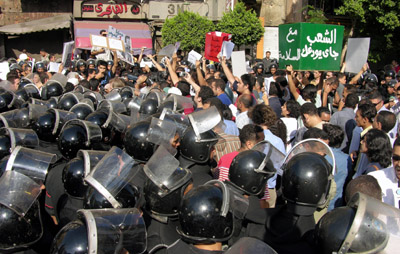
Human rights coverage spreads, despite government pushback
By Mohamed Abdel Dayem and Robert Mahoney The media in the Middle East loved the Intifada. Every detail of Israel’s violations of human rights in the late 1980s in the West Bank and Gaza appeared in the Arabic and Farsi press. The governments that owned or controlled these media outlets loved it, too. When pan-Arab…
Attacks on the Press 2009: Bahrain
Top Developments• Authorities block Web sites critical of the government, the king, and Islam.• Officials pursue politicized court complaints against critical reporters. Key Statistic 1,040: Web sites that the Ministry of Information ordered censored in September. Bahrain has made significant strides in improving its human rights record since political reforms enacted in 2001, particularly concerning universal suffrage…
Attacks on the Press 2009: Iran
Top Developments• Dozens of journalists are detained in massive post-election crackdown.• Numerous critical newspapers, Web sites censored or shut down. Key Statistic 23: Journalists imprisoned as of December 1, 2009. Amid the greatest national political upheaval since the 1979 Islamic Revolution, Iran launched a full-scale assault on the media and the opposition. In mid-June, mass protests erupted…
Attacks on the Press 2009: Iraq
Top Developments• Fatalities and abductions plummet as security situation improves.• Prime minister, others file lawsuits to harass media. Kurdish courts jail six journalists. Key Statistic 4: Journalists killed in connection to their work, the lowest tally since the war began in 2003. Four Iraqi journalists were killed because of their work as the press continued to face…
Attacks on the Press 2009: Israel and the Occupied Palestinian Territory
Top Developments• Israel bars international press access to Gaza fighting.• Fatah, Hamas detain, harass media perceived as biased. Key Statistic 4: News media buildings in Gaza hit by Israeli airstrikes. As the year began, the Israeli military waged a ground offensive into the Gaza Strip in response to a series of Hamas rocket attacks on Israeli…
Attacks on the Press 2009: Libya
Top Developments• Regime pursues defamation cases in Morocco and other countries.• Qaddafi nationalizes the nation’s sole private television station. Key Statistic 3: Moroccan newspaper ordered to pay damages for “injuring the dignity” of Col. Muammar Qaddafi. Col. Muammar Qaddafi marked in September the 40th anniversary of the coup that brought him to power and led to the…
Attacks on the Press 2009: Morocco
Top Developments• Authorities censor, jail journalists to silence coverage of the royal family. • Politicized courts issue heavy defamation awards. Key Statistic 100,000: Copies of two weeklies destroyed by authorities because they carried a poll about the king. As King Mohammed VI marked his first decade on the Alawite throne, his government moved aggressively to censor coverage…
Attacks on the Press 2009: Sudan
Top Developments• Government continues to impose vast censorship.• New press law falls short of international standards. Key Statistic 9: Men executed in editor’s murder. Observers call it a miscarriage of justice. Sudanese journalists worked amid political uncertainty and severe restrictions. Pervasive official censorship restricted journalists from closely reporting on the tumultuous events of 2009: The International Criminal…
Attacks on the Press 2009: Tunisia
Top Developments• Government engineers ouster of independent journalist union leaders.• Two journalists are jailed in retaliation for critical reporting. Key Statistic 97: Percentage of newspaper campaign coverage that was devoted to President Ben Ali. President Zine el Abidine Ben Ali was re-elected to a fifth term with 90 percent of the vote amid severe restrictions on…
Attacks on the Press 2009: Yemen
Top Developments • Government censors newspapers, establishes new press court. • Two journalists jailed without charge; one missing after being abducted. Key Statistic 8: Newspapers banned for periods beginning in May due to their coverage of unrest in the south. Continuing a steady years-long decline, Yemen became one of the most repressive countries in the…